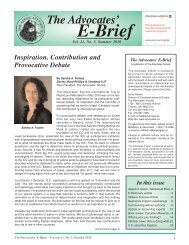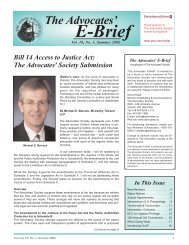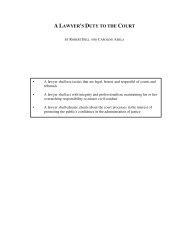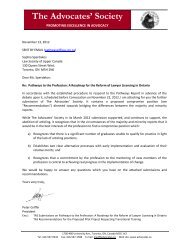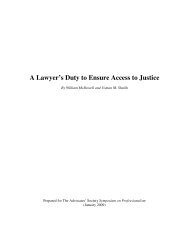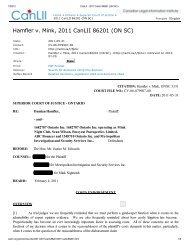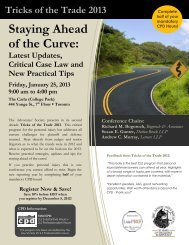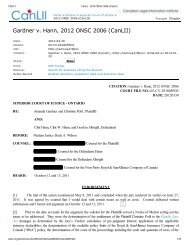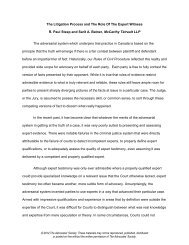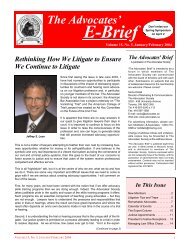E-Brief Sept - Oct - The Advocates' Society
E-Brief Sept - Oct - The Advocates' Society
E-Brief Sept - Oct - The Advocates' Society
You also want an ePaper? Increase the reach of your titles
YUMPU automatically turns print PDFs into web optimized ePapers that Google loves.
(Continued from page 9)<br />
pleading precedent in any of these texts<br />
that exceeds 10 pages).<br />
2. Understand the distinction<br />
between a material fact and evidence:<br />
Perhaps even more obvious,<br />
but it seems that what should be obvious<br />
is difficult to grasp. Material facts<br />
establish the cause of action, and evidence<br />
is used to prove those material<br />
facts. In a breach of contract claim, you<br />
need to plead the provision on which<br />
the plaintiff relies (e.g. payment was<br />
due December 31) and the fact it was<br />
breached (no payment was made on<br />
December 31). <strong>The</strong> letters and phone<br />
calls made by the plaintiff reminding the<br />
defendant to pay on December 31 are<br />
unlikely, in a simple breach of contract<br />
claim, to be material facts; this is evidence<br />
and does not need to be pleaded.<br />
Further, every document mentioned<br />
in your claim (the numerous reminder<br />
letters) must now, pursuant to recent<br />
changes to the Rules, be attached to<br />
At Lerners, we look at referrals from your<br />
perspective. When you refer matters to us,<br />
you can trust us to help you achieve<br />
the best results - all the while respecting<br />
the relationship that is rightly yours.<br />
Complete. Trust.<br />
Lerners LLP<br />
Barristers & Solicitors<br />
Toronto Office<br />
416.867.3076<br />
London Office<br />
519.672.4131<br />
www.lerners.ca<br />
the plaintiff's claim. Why plead a document unless it is necessary? More importantly, if you want to ensure your claim attacked<br />
then you should plead lots of evidence, which is all properly struck from any claim.<br />
3. Tell a story, but do it in a concise and easy-to-read manner: We are advocates, and there is no reason why a claim must be<br />
a turgid document that will cure insomnia; however, this is not an exercise in rhetoric, and colourful (or any) adjectives and adverbs<br />
normally should be avoided. Similarly, this is not an exercise in post-modern deconstruction nor a demonstration that you can write<br />
the script to the next Atom Egoyan movie. Lawyers, and more importantly judges, think in a linear manner. Using headings, tell<br />
your client's story in a logical and concise manner. In many commercial cases, there is a short simple story to tell. Be judicious and<br />
remember your claim can come back to haunt you.<br />
4. Identify the claims you are pleading: Despite falling into the land of “so obvious<br />
it is patronizing to mention it,” I regularly see commercial claims where the cause(s)<br />
of action is (are) not identified. This is not impressive, but it does keep defence counsel<br />
on their toes.<br />
MUG SHOT<br />
5. Remember the claims that require more particulars: I also see lengthy pleadings<br />
in which common claims like misrepresentation are insufficiently pleaded.<br />
Remember that the Rules and common law require certain claims, like misrepresentation,<br />
to be pleaded with particularity. Particularity means that the material facts<br />
include who, what, when, where and how. This is not an excuse to throw in irrelevant<br />
evidence, or even worse, speculation, about motives and how poorly your client was<br />
treated (unless, perhaps, you are making a punitive or aggravated damages claim).<br />
6. Repeating something is unnecessary, but once is sufficient: Of course you<br />
want to emphasize certain material facts or issues, but repeating something more<br />
than once is not going to make your document more persuasive or immune to attack,<br />
it will just make it longer.<br />
7. Save time for a good edit: Typos and grammatical mistakes, which are legion in<br />
the pleadings I see, are not impressive. More importantly, one good edit can always<br />
reduce the length of a legal document by at least 10%, if not more. You are doing<br />
your client a serious disservice if you have not saved time to thoroughly edit your<br />
claim.<br />
Not yet convinced? Worried that your persuasive, concise pleading is still going to<br />
be attacked? I deal with these concerns in the next edition of this series.<br />
Please support Campbell<br />
House by purchasing<br />
mugs @ $5.<br />
To order, please call the<br />
museum at 416-597-0227.<br />
10<br />
VOLUME 17, NO. 1, SUMMER 2005



